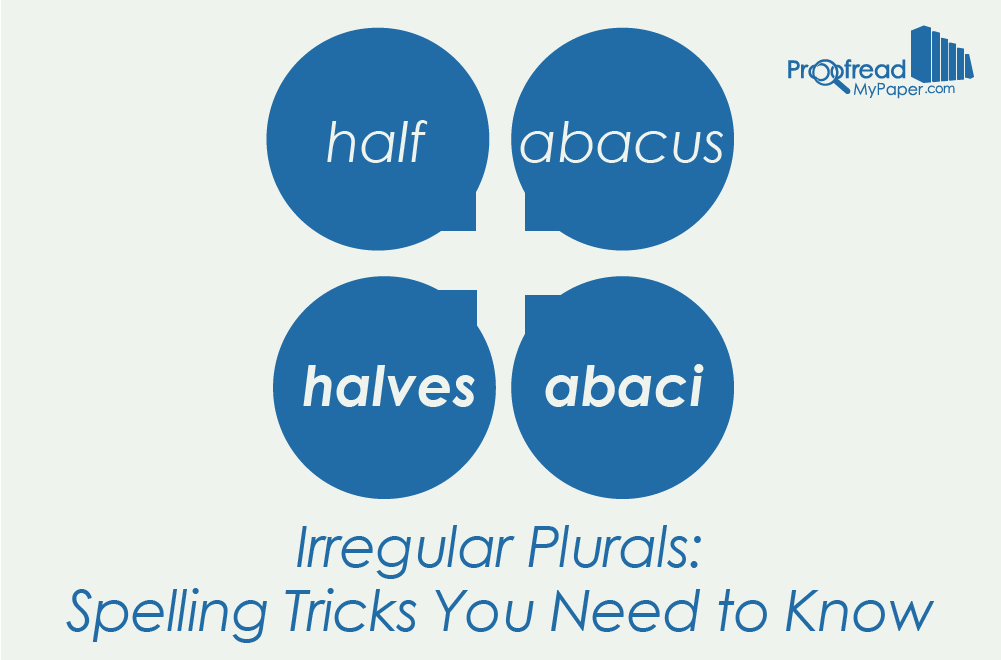Why, English? Why do you do this to us? Whenever we think we’ve figured out the rules, it turns out you have a bunch of counterexamples tucked away somewhere in the dictionary.
Possibly the most famous way the English language likes to keep us guessing is with irregular plural nouns. These are words that don’t follow the usual spelling convention of adding an “-s” to make a plural (for instance, “one dog” becomes “many dogs”).
Words that end in a “-y” are one example, but there are plenty of others. Luckily, we have some guidelines for spelling different kinds of irregular plural. It all depends on how the word ends…
Words Ending “-f” or “-fe”
When a word ends in an “-f” or “-fe,” the general rule is to replace the “-f” or “-fe” with “-ves” when forming a plural (like how “calf” becomes “calves”). Examples include:
|
Singular |
Plural |
|
Half |
Halves |
|
Life |
Lives |
|
Scarf |
Scarves |
This does not apply when a word ends in a “-ff,” so “sheriff” becomes “sheriffs” (not “sherives”). Other exceptions include “chiefs” and “beliefs.”
Words Ending “-us”
Often originating in Latin, words that end in “-us” typically take an “-i” in plural form, such as when “cactus” becomes “cacti”:
|
Singular |
Plural |
|
Abacus |
Abaci |
|
Nucleus |
Nuclei |
|
Hippopotamus |
Hippopotami |
Again, there are exceptions to this rule, notably “virus” (which becomes “viruses”) and “octopus” (for which “octopuses” – not “octopi” – is the standard plural). Likewise, “hippopotamuses” and “abacuses” are now also commonly accepted as correct variations of the older Latin spellings.
Words Ending “-on” or “-um”
Other Latin-derived word endings to look out for include “-on” and “-um,” both of which take an “-a” when forming a plural (so “criterion” becomes “criteria” and “stadium” becomes “stadia”). Additional examples include:
|
Singular |
Plural |
|
Phenomenon |
Phenomena |
|
Millennium |
Millennia |
|
Automaton |
Automata |
|
Bacterium |
Bacteria |
Keep in mind, though, that modern English allows regular plural endings for some of these words, too. For instance, “stadiums” is now a more common plural of “stadium” than the traditional “stadia.”
Find this useful?
Subscribe to our newsletter and get writing tips from our editors straight to your inbox.
Words Ending “-is” or “-ix”
Words with Latin or Greek origins and “-is,” “-ex” or “-ix” endings tend to change to “-es” or “-ices” in their plural forms, so “analysis” becomes “analyses” and “appendix” becomes “appendices”:
|
Singular |
Plural |
|
Crisis |
Crises |
|
Dominatrix |
Dominatrices |
|
Axis |
Axes |
|
Vortex |
Vortices |
Words that Change Vowel Sounds
To make matters even more confusing, some words change their vowel sound completely when forming a plural, like how “foot” becomes “feet”. See also:
|
Singular |
Plural |
|
Woman |
Women |
|
Tooth |
Teeth |
|
Mouse |
Mice |
Words that Stay the Same
Some irregular plurals actually stay the same as the singular form of the word. Examples include “squid,” “sheep,” “fish,” and “species.” For instance, both “a fish” (singular) and “a shoal of fish” (plural) are correct.
It’s also worth noting that uncountable nouns, like “water” or “sand,” stay the same regardless of the amount being described.
